Comprehensive Guide to Garden Maintenance in Willesden
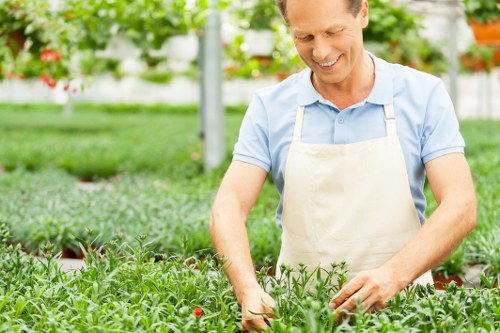
Introduction to Garden Maintenance
Maintaining a beautiful garden in Willesden requires regular care and attention. Whether you're a seasoned gardener or just starting, understanding the basics of garden maintenance can help you achieve a thriving outdoor space.
Willesden's unique climate and soil conditions present both opportunities and challenges for gardeners. By implementing effective maintenance strategies, you can ensure your garden remains vibrant and healthy throughout the year.
In this guide, we'll explore essential garden maintenance tips tailored specifically for the Willesden area. From seasonal tasks to pest control, we've got you covered.
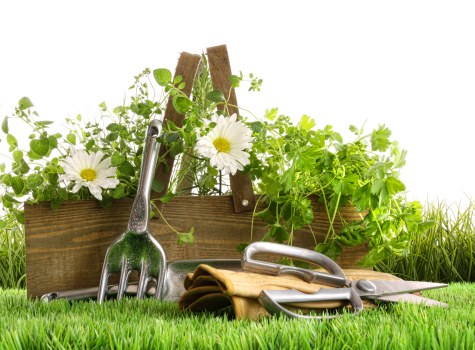
Seasonal Garden Maintenance
Spring Care
Spring is a critical time for garden maintenance in Willesden. As the weather warms up, plants begin to revive from winter dormancy.
Start by cleaning up your garden beds, removing any debris or dead foliage. This helps prevent disease and pests from taking hold.
Planting new flowers and vegetables should be done after the last frost date to ensure they have the best chance of thriving.
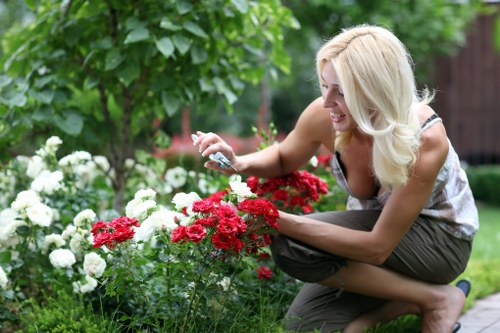
Summer Care
During the summer months, maintaining adequate watering is essential. Willesden can experience hot spells, so ensure your plants receive consistent moisture.
Regular weeding is crucial to reduce competition for nutrients and water. Mulching can help retain soil moisture and suppress weed growth.
Pruning shrubs and trees helps maintain their shape and promotes healthy growth.
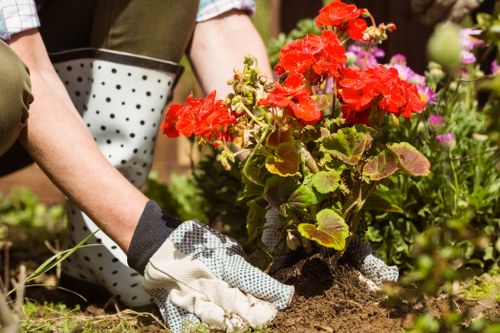
Autumn Care
As temperatures drop, preparing your garden for winter is vital. Clear out spent plants and add compost to enrich the soil.
Protect tender plants by covering them or moving potted plants indoors. This helps them survive the colder months.
Rake fallen leaves to prevent them from suffocating your lawn and garden beds.
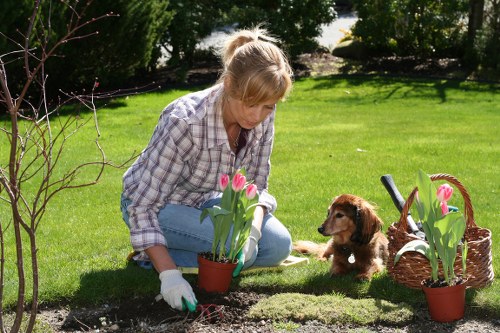
Winter Care
Winter maintenance involves protecting your garden from frost and snow. Use mulch to insulate plant roots and prevent temperature fluctuations.
Regularly check for any signs of disease or pest activity, even during the colder months.
Plan and prepare for the upcoming growing season by researching new plants and garden designs.
Selecting the Right Tools
Having the right tools is fundamental for effective garden maintenance in Willesden. Invest in quality tools that suit your specific gardening needs.
Key tools include:
- Pruning shears for trimming plants
- A sturdy spade and fork for soil cultivation
- Watering equipment such as hoses and sprinklers
- Gardening gloves to protect your hands
- A wheelbarrow for transporting materials
Pest and Disease Management
Identifying Common Pests
Pests can pose significant threats to your garden's health. Common pests in Willesden include aphids, slugs, and snails.
Regularly inspect your plants for signs of infestation, such as chewed leaves or visible insects.
Implement natural pest control methods, such as introducing beneficial insects or using organic pesticides.
Preventing Plant Diseases
Diseases like powdery mildew and root rot can devastate your garden. To prevent these issues, practice good garden hygiene.
Ensure proper spacing between plants to allow for adequate air circulation. This helps reduce the likelihood of fungal growth.
Rotate your crops annually to prevent soil-borne diseases from accumulating.
Soil Health and Fertilization
Testing and Improving Soil
Healthy soil is the foundation of a thriving garden. Conduct soil tests to determine pH levels and nutrient content.
Amend your soil based on test results. Adding compost or organic matter can enhance soil structure and fertility.
Implement crop rotation and cover cropping to maintain soil health and prevent nutrient depletion.
Effective Fertilization Strategies
Proper fertilization ensures your plants receive the necessary nutrients for growth. Use balanced fertilizers that provide essential macro and micronutrients.
Apply fertilizers at the right time, typically during the planting season and periodic top-dressing throughout the growing season.
Avoid over-fertilizing, as this can lead to nutrient runoff and environmental damage.
Lawn Care in Willesden
Mowing and Trimming
Maintaining a lush lawn involves regular mowing and trimming. Adjust mowing height based on the grass type to promote deep root growth.
Leave grass clippings on the lawn to act as natural fertilizer, returning nutrients to the soil.
Edge your lawn to maintain clean boundaries between grass and other garden elements.
Weed Control
Weeds compete with your grass for resources. Implement a consistent weed control regimen to keep your lawn healthy.
Use pre-emergent herbicides in the spring to prevent weed seeds from germinating.
Manual weeding is effective for removing stubborn weeds without harming your lawn.
Garden Design and Layout
Planning Your Garden
A well-planned garden layout enhances both aesthetics and functionality. Consider factors like sunlight, soil type, and water availability when designing your garden.
Incorporate a mix of perennials and annuals to ensure continuous blooms throughout the seasons.
Use raised beds or container gardening if space is limited, which is common in urban areas like Willesden.
Choosing the Right Plants
Select plants that are well-suited to Willesden's climate. Native plants typically require less maintenance and are more resilient.
Consider the mature size of plants to avoid overcrowding and ensure adequate growth space.
Incorporate a variety of textures and colors to create a visually appealing garden.
Irrigation and Water Management
Efficient Watering Techniques
Efficient irrigation is crucial for sustainable garden maintenance. Drip irrigation systems deliver water directly to the plant roots, reducing waste.
Water your garden early in the morning to minimize evaporation and ensure plants receive adequate moisture.
Collect rainwater using barrels to supplement your watering needs and promote environmental sustainability.
Rainwater Harvesting
Rainwater harvesting is an eco-friendly method to support your garden's water requirements. Install rain barrels to capture and store rainwater from your roof.
Use harvested rainwater for watering plants, reducing reliance on municipal water supplies.
Ensure your rain barrels are covered to prevent mosquito breeding and debris accumulation.
Mulching and Composting
Benefits of Mulching
Mulching offers numerous benefits, including moisture retention, temperature regulation, and weed suppression.
Apply a layer of organic mulch, such as bark or straw, around your plants to enhance soil health.
Renew mulch annually to maintain its effectiveness and aesthetic appeal.
Composting Techniques
Composting is an excellent way to recycle garden waste and produce nutrient-rich soil amendments.
Set up a compost bin in your garden and regularly add kitchen scraps, leaves, and grass clippings.
Turn the compost pile periodically to aerate it and speed up the decomposition process.
Pruning and Trimming
Pruning Trees and Shrubs
Regular pruning helps maintain the shape and health of trees and shrubs. Remove dead or diseased branches to prevent the spread of pests.
Prune during the appropriate season for each plant type to encourage optimal growth.
Use sharp, clean tools to make precise cuts and reduce the risk of plant damage.
Trimming Hedges and Lawns
Hedge trimming defines the boundaries of your garden and promotes dense, healthy growth. Trim hedges at least twice a year to maintain their shape.
Regular lawn trimming ensures a neat appearance and prevents overgrowth.
Use electric or gas-powered trimmers for efficiency and ease of use.
Garden Lighting and Fixtures
Enhancing Garden Aesthetics
Garden lighting highlights key features and extends the usability of your garden into the evening hours.
Use solar-powered lights for an eco-friendly lighting solution that requires minimal maintenance.
Incorporate a mix of ambient, task, and accent lighting to create a layered and inviting outdoor space.
Installing Irrigation Systems
Automated irrigation systems streamline your watering routine and ensure consistent moisture levels.
Choose a system that matches your garden's size and plant variety for optimal performance.
Regularly inspect and maintain your irrigation system to prevent leaks and ensure efficient water use.
Organic Gardening Practices
Sustainable Gardening
Organic gardening emphasizes sustainability and environmental responsibility. Avoid synthetic chemicals and focus on natural alternatives.
Use organic fertilizers and pest control methods to maintain a healthy garden ecosystem.
Encourage biodiversity by planting a variety of species that attract beneficial insects and wildlife.
Benefits of Organic Gardening
Organic gardening promotes soil health, reduces pollution, and supports local wildlife. It also results in healthier plants free from chemical residues.
By choosing organic methods, you contribute to a more sustainable environment and create a safer garden space for your family.
Adopting organic practices can also enhance the flavor and nutritional value of your edible plants.
Hardscaping and Garden Structures
Incorporating Pathways and Patios
Hardscaping elements like pathways and patios add structure and functionality to your garden. They provide areas for relaxation and navigation.
Choose materials that complement your garden's aesthetic, such as natural stone or brick.
Ensure proper drainage to prevent water pooling and damage to hardscape features.
Building Garden Structures
Structures like pergolas, sheds, and greenhouses enhance your garden's utility and appeal. They offer additional storage and protection for plants.
Design garden structures to blend seamlessly with your existing landscape and architectural style.
Regularly maintain these structures to ensure their longevity and functionality.
Sustainable Garden Practices
Water Conservation Methods
Implementing water conservation techniques is essential for sustainable garden maintenance in Willesden. Drip irrigation and rainwater harvesting are effective methods.
Mulching and composting also contribute to water retention and soil health, reducing the need for frequent watering.
Choose drought-resistant plants to minimize water usage and ensure garden resilience during dry spells.
Reducing Carbon Footprint
Adopt practices that reduce your garden's carbon footprint, such as using renewable energy-powered garden lights and manually operated tools.
Minimize waste by composting and recycling garden materials whenever possible.
Promote biodiversity to create a balanced ecosystem that naturally controls pests and supports healthy plant growth.
Professional Garden Maintenance Services
When to Hire Professionals
While DIY garden maintenance is rewarding, certain tasks may require professional expertise. Hiring garden maintenance services in Willesden can save you time and ensure optimal results.
Consider professional help for complex tasks like tree pruning, irrigation system installation, and landscape design.
Professional gardeners can also provide tailored maintenance schedules to suit your garden's specific needs.
Choosing the Right Service Provider
Select a reputable garden maintenance company with experience in Willesden's local conditions. Look for providers with positive reviews and a portfolio of previous work.
Ensure the service offers a comprehensive range of maintenance tasks, from regular lawn care to seasonal planting.
Discuss your garden goals and preferences to ensure the service aligns with your vision.
Benefits of Regular Garden Maintenance
- Enhanced Aesthetics: A well-maintained garden boosts curb appeal and creates a pleasant outdoor environment.
- Increased Property Value: Regular maintenance can enhance your property's market value.
- Healthier Plants: Consistent care ensures plants are robust and disease-resistant.
- Environmental Benefits: Sustainable practices support local biodiversity and reduce environmental impact.
- Personal Well-being: Gardening can provide relaxation and a sense of accomplishment.
DIY Garden Maintenance Tips
Time Management
Balancing garden maintenance with daily responsibilities can be challenging. Create a maintenance schedule to allocate specific times for gardening tasks.
Prioritize essential tasks and break them down into manageable steps to avoid feeling overwhelmed.
Utilize weekends or evenings for more time-consuming activities like planting and pruning.
Cost-Effective Maintenance
You don't need to break the bank to maintain a beautiful garden. Implementing cost-effective strategies can help manage expenses.
Reuse and recycle materials, such as composting kitchen scraps and using repurposed containers for planting.
Invest in multi-purpose tools to reduce the number of items you need to purchase.
Common Gardening Mistakes to Avoid
Overwatering
Overwatering can be just as harmful as underwatering. It leads to root rot and nutrient leaching, weakening your plants.
Ensure you understand each plant's specific water requirements and adjust your watering schedule accordingly.
Use moisture meters to accurately gauge soil moisture levels.
Ignoring Soil Health
Healthy soil is essential for robust plant growth. Neglecting soil health can result in weak plants and poor yields.
Regularly amend your soil with organic matter and monitor nutrient levels to maintain balance.
Avoid compacting the soil, which restricts root growth and reduces oxygen availability.
Innovative Gardening Techniques
Vertical Gardening
Vertical gardening maximizes space by growing plants upward rather than outward. This is especially useful in urban areas like Willesden with limited space.
Use trellises, wall-mounted planters, or vertical garden systems to cultivate a variety of plants, including vegetables and flowers.
Vertical gardens can also enhance air quality and provide natural insulation for surrounding structures.
Rain Gardens
Rain gardens are designed to capture and absorb runoff, reducing flooding and improving water quality.
Plant native species that thrive in both wet and dry conditions to create a resilient rain garden.
Proper placement is key—situate your rain garden in areas where runoff naturally collects.
Conclusion
Effective garden maintenance in Willesden involves a combination of regular care, proper planning, and sustainable practices. By following the tips and strategies outlined in this guide, you can cultivate a beautiful and healthy garden that enhances your outdoor living space.
Whether you choose to maintain your garden yourself or enlist the help of professionals, consistent effort will pay off in the form of a vibrant and thriving garden.
Contact us today to learn more about our garden maintenance services and start transforming your garden into the oasis you've always dreamed of.